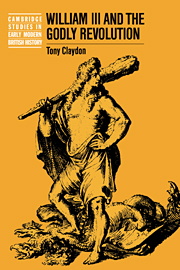Book contents
- Frontmatter
- Contents
- List of illustrations
- Acknowledgements
- List of abbreviations
- Notes on style
- Introduction
- 1 Courtly reformation and the revolution of 1688–1689
- 2 The resources for royal propaganda
- 3 The propagation of courtly reformation
- 4 Courtly reformation, the war, and the English nation
- 5 Courtly reformation and the politics of party
- 6 Courtly reformation and country politics
- Conclusion
- Bibliography
- Index
- Cambridge Studies in Early Modern British History
Introduction
Published online by Cambridge University Press: 09 October 2009
- Frontmatter
- Contents
- List of illustrations
- Acknowledgements
- List of abbreviations
- Notes on style
- Introduction
- 1 Courtly reformation and the revolution of 1688–1689
- 2 The resources for royal propaganda
- 3 The propagation of courtly reformation
- 4 Courtly reformation, the war, and the English nation
- 5 Courtly reformation and the politics of party
- 6 Courtly reformation and country politics
- Conclusion
- Bibliography
- Index
- Cambridge Studies in Early Modern British History
Summary
WILLIAM'S NEGLECTED IDEOLOGY: THE SCOPE OF THE STUDY
Most governments feel a need to advertise themselves to their populations. The regime of William III, king of England at the end of the seventeenth century, must have felt this need more than most. From his accession at the Glorious Revolution, to his death in 1702, this monarch was faced with a series of extraordinary challenges to his authority which demanded an effective propaganda if they were to be overcome. At the most basic level, William had to deal with doubts about his very right to rule. Because he had not inherited the throne in 1689, but had gained it after forcibly invading the country, the king was denied the usual claim of English monarchs to hereditary legitimacy, and had to establish some other justification for his exercise of power. Still more unfortunately, William's predecessor, James II, had not renounced his claims to the throne. Once displaced at the Revolution, the old monarch launched a military and ideological campaign to regain his position, whose arguments, as well as whose arms, had to be rebuffed. Compounding these problems of legitimacy was the need for war propaganda. Soon after becoming king, William took his new realm into a prolonged conflict with France, and consequently had to develop a royal message to preserve his subject's morale during a prolonged, bloody, and frequently discouraging struggle. Finally, the monarch had to find a language which would persuade independently minded legislators of the correctness of his policies.
- Type
- Chapter
- Information
- William III and the Godly Revolution , pp. 1 - 23Publisher: Cambridge University PressPrint publication year: 1996

